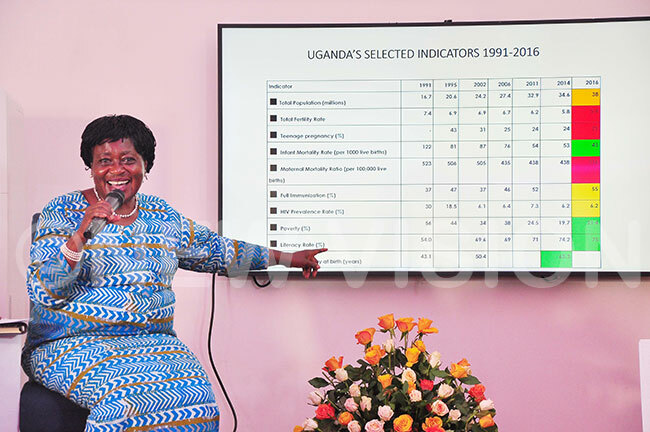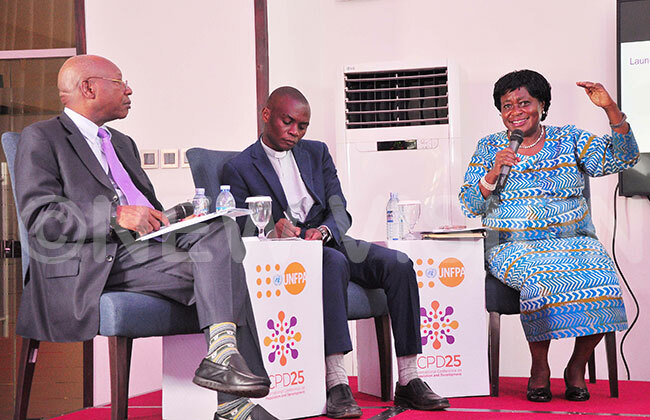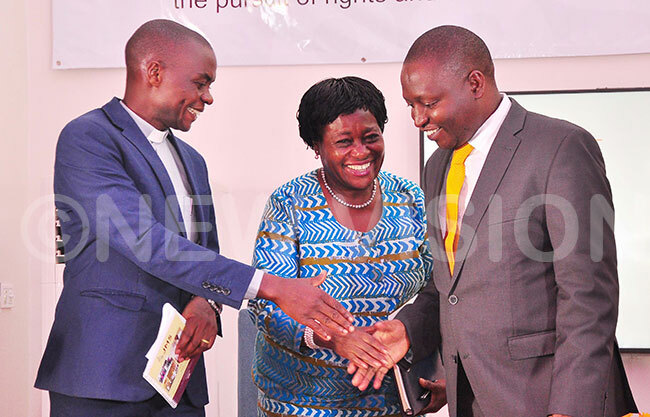It is depressing to preside over a funeral of a mother who has died giving birth, says Priest
As a priest, Semugooma has presided over several funerals for mothers who died giving birth and infants who died at birth but such happenings send cold chills in his spine.
REPRODUCTIVE HEALTH
KAMPALA - Presiding over a funeral service of a mother who has died giving birth is one of the most depressing and saddening moments for Reverend Moses Semugooma, a family planning champion from Mityana Church of Uganda in Mityana district.
As a priest, Semugooma has presided over several funerals for mothers who died giving birth and infants who died at birth but such happenings send cold chills in his spine.
"It is very saddening as a religious leader to be called upon to preside over a funeral service of a mother who has died while giving birth. It is something that I always pray that it doesn't happen," Semugooma says.
He notes that saving mothers from dying while giving birth is within the means of every individual and religious leaders need to take centre stage.
"We are always at the pulpit preaching the people about God and to get saved. We should also tell them how to save their lives by promoting sexual reproductive health rights," Semugooma says.
Currently, Uganda is still grappling with the ugly realities of losing 16 women every day due to pregnancy-related complications.
While presenting as a panelist at the press launch of the State of the World Population Report 2019 in Kampala late last month, Semugooma said such happenings should be eye openers to religious leaders to advocate for better sexual reproductive health services and rights.
 Dr. Olive Sentumbwe shows statistics during the press conference
Dr. Olive Sentumbwe shows statistics during the press conference
"As religious leaders, we have the obligation to advise our followers on what is right. We all know unplanned families are a source of poverty, we all know the dangers of unwanted pregnancies, we all know how contraceptives are important but why are we not telling the people?" Semugooma says.
Semugooma who is also a sexual reproductive health rights advocate loves talking about family planning, women empowerment, and maternal health.
Speaking about the planning methods, Semugooma advocates for condom use and all the other modern methods but says women must be empowered to voluntarily make the right choices.
"I would encourage married couples to use condoms and all the other modern methods but for adolescents, it is better to abstain. With condoms and abstinence, we are curbing teenage pregnancy, HIV infections, Sexually transmitted diseases, and poverty," Semugooma says.
Female sexual and reproductive health is among the issues most affected by religion since most religions promote high fertility, early marriage, non-use of contraceptives.
"Even when you are on the pulpit, you can advise people on family planning. As a church, if we want our people to develop, we must tackle these social aspects that are trapping them in poverty," Semugooma says.
Semugooma's words come at the time when the world is marking 25 years since the International Conference on Population and Development (ICPD) was held in Cairo.
During the ICPD in 1994, governments globally adopted a revolutionary agreement calling for women's reproductive health and rights to take centre stage in development efforts.
Since then, access to voluntary family planning has expanded around the world. Today 58% of women use modern contraceptives compared to 52% to 1994.
In Uganda, 35% of women use modern family planning methods, an increase from 26% in 2006.
The number of women who die from pregnancy-related causes has dropped from 506 per 100,000 live births in 1995 to 336 in 2016 according to the National Population Council.
The State Minister of Finance for Planning David Bahati who officiated the launch of the report said the progress is worth celebrating but says a lot needs to be done.
"This is great news for me who lost my mother when I was very young at the age of three. I don't know the picture of my mother, I was told she died giving birth to the person who follows me," Bahati said.

Unfinished business
According to the State of World Population 2019 titled Unfinished business, there has been progress made in sexual reproductive health rights but these gains are not enough.
Marginalized groups, in particular, face some of the highest unmet need for sexual and reproductive health services, the report says.
These include ethnic minorities, youth, unmarried people, people with disabilities, and those living in poverty.
And in some circumstances, people are even losing access to the services they need to exercise their reproductive rights.
Currently, 850,000 women in Uganda get unwanted pregnancies, with many either dying or sustaining related health complications. Figures from the Uganda Bureau of Statistics (UBOS) show that Ugandan women, on average, give birth to nearly two children more than they want (5.4 vs. 4.2).
Currently in Uganda fertility in the last five years has fallen from 6 to 5 children average per woman. But it is still one of the highest in the world.
Also, teenage pregnancy (25%) still remains an issue in Uganda and, this has contributed to high fertility (5 children per woman) and a high population growth rate of 3.0 percent and a youthful population with a high child-dependency ratio of 103.
The Uganda Demographic Health Survey (UDHS) report 2016, shows about 25% of adolescent women aged 15-19 years were already mothers or pregnant with their first child.
"I don't know why men are going for young girls. It is very disturbing and we need to talk about these issues and find solutions," Bahati said.
Also, the maternal mortality rate remains high although it has reduced compared to 1994.
He noted that a lot needs to be done to ensure universal access to sexual and reproductive health, and rights services in Uganda and to ensure there is fast progress.
 Rev. Moses Semugooma (left) interacts with Bahati (right) and Dr. Sentumbwe (centre)
Rev. Moses Semugooma (left) interacts with Bahati (right) and Dr. Sentumbwe (centre)
"There is a lot to do to get where we want to be but to start with, we need to improve household incomes. When our people have economic empowerment, they will be able to take care of some of these challenges," Bahati says.
The Ministry of Health puts the national unmet need for contraception at 40%, meaning that four in 10 people who would want to use contraception cannot.
Uganda's target is to reduce the unmet need for family planning to 10% and increase the contraceptive prevalence rate to 50% by 2020.
According to Dr. Olive Sentumbwe, the head of Family Health and Population at World Health Organisation Uganda, in Cairo governments agreed that population policies should address social development beyond family planning, especially the advancement of women, and that family planning should be provided as part of a broader package of reproductive health care.
"The progress is very slow. The issue of safe motherhood and maternal health still remains. How can we continue losing 16 mothers every day? This issue is not for the Ministry of Health but for everyone," Sentumbwe says.
The United Nations Population Fund (UNFPA) country representative Alain Sibenaler, called for stakeholders to accomplish the commitment they made in Cairo.
"We need to empower girls to make fundamental decisions about their own bodies. They must have the power to choose when to get pregnant, which man to marry, choose the contraception to use and have the power to say no," Sibenaler said.
Some of the key statistics that need to be keenly watched are the high fertility rate at 5.4%, high maternal mortality rate, and teenage pregnancy at 25%.
Although Uganda has the second fastest growing population in the world at a rate of 3.3%, Sibenaler says if the population is educated, healthy and skilled, it will be an opportunity for Uganda.
"Now it's time to finish the unfinished business in pursuit of ensuring rights and choices for women and girls and access to education, family planning, and ending child marriages," Sibenaler said.
Uganda's population is projected to reach 70 million in 2040 at a time which the country projects to attain its middle-income status.